TL;DR:
- PythiaCHEM, an AI and ML toolkit, is making significant strides in the field of chemistry.
- It addresses the challenge of small and sparse datasets, offering tailored solutions for chemistry tasks.
- Built in Python and integrated with Jupyter Notebooks, it simplifies setup and allows for modular expansion.
- PythiaCHEM boasts a range of ML algorithms and six user-friendly modules.
- The toolkit’s effectiveness is demonstrated in two chemistry tasks, showcasing its precision and versatility.
Main AI News:
In the ever-evolving landscape of Artificial Intelligence (AI) and Machine Learning (ML), where innovation knows no bounds, PythiaCHEM emerges as a game-changer. The synergy between AI and ML has been a driving force behind transformative breakthroughs in various domains, from natural language processing to pharmaceuticals. Notably, chemistry stands out as an arena where ML has made profound inroads, aiding researchers in intricate tasks such as drug discovery and molecular property prediction.
However, despite its meteoric rise, the realm of ML modeling has faced challenges when dealing with small and sparse datasets. The primary hurdle stems from the insatiable hunger for labeled data, a resource often scarce in compact datasets. To surmount this limitation, the ingenious minds behind PythiaCHEM present a solution—a specialized ML toolkit designed exclusively for chemistry applications.
PythiaCHEM’s Foundation and Structure
Python serves as the robust foundation upon which PythiaCHEM is built, with the entire toolkit seamlessly organized within Jupyter Notebooks. Leveraging the power of open-source Python libraries like Matplotlib, Pandas, Numpy, and more, PythiaCHEM simplifies installation through pip, ensuring a hassle-free setup. Remarkably, its modular architecture allows for effortless integration with other toolkits without compromising its core functionality.
A Plethora of ML Algorithms at Your Fingertips
PythiaCHEM offers a rich repertoire of ML algorithms, including Decision Trees, Support Vector Machines, and Logistic Regression, among others. Notably, this toolkit boasts the flexibility to accommodate additional algorithms based on the unique needs of users. PythiaCHEM neatly organizes its features into six user-friendly modules: fingerprints, classification metrics, molecules and structures, plots, scaling, and workflow functions.
Putting PythiaCHEM to the Test
To gauge the efficacy and adaptability of PythiaCHEM, dedicated researchers subjected it to rigorous testing in two distinct chemistry tasks.
- Unmasking Transmembrane Chloride Anion Transport Activity: The first task involved classifying the transmembrane chloride anion transport activity of synthetic anion transporters. Through meticulous analysis, it was revealed that the Gaussian Process (GP) and Extra Trees (ET) algorithms outshone their counterparts. Both GP and ET demonstrated exceptional precision and recall, effectively distinguishing between positive and negative class predictions. Delving deeper with SHAP analysis, it became apparent that GP focused on experimental conditions, while ET emphasized specific molecular properties.
- Predicting Enantioselectivity in Strecker Synthesis: The second task revolved around predicting the enantioselectivity in the Strecker synthesis of α-amino acids. The LASSOCV ML model emerged as the standout performer, offering profound insights into electronic and steric receptors that influence reaction selectivity.
PythiaCHEM: A Beacon of Opportunity
PythiaCHEM shines as an open-source ML toolkit uniquely tailored for chemistry tasks characterized by limited datasets. Its incorporation of Jupyter Notebooks brings an element of user-friendliness and automation, catering to both beginners and seasoned experts. The toolkit’s exemplary showcase in two distinct chemistry challenges underscores its potential and versatility. Through this platform, the authors of this research paper aspire to foster a deeper comprehension of ML models and empower the development of potent applications within the realm of chemistry.
Conclusion:
The emergence of PythiaCHEM as a specialized ML toolkit for chemistry tasks signifies a significant advancement in the field. Its ability to handle small and sparse datasets, coupled with its user-friendly design and robust algorithmic offerings, positions it as a valuable asset for the chemistry community. PythiaCHEM has the potential to accelerate research and innovation in chemistry, opening up new opportunities for predictive modeling and data-driven insights in the market.

